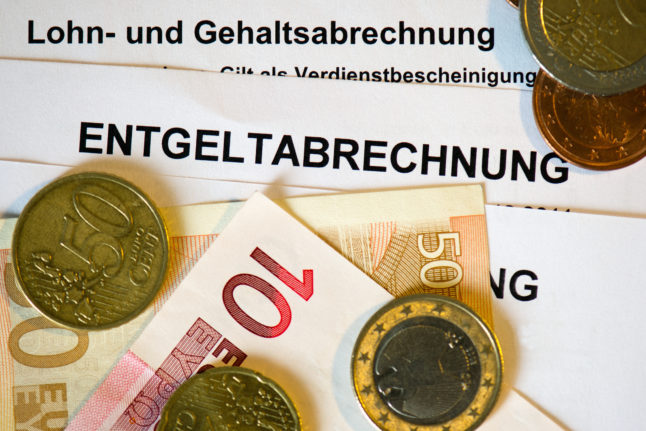If you’re an employee in a German company or organisation, it’s very likely that you’ll receive your wages once a month – usually around the end of the month but your bosses should tell you the exact date of payment when you start working there.
You should also receive a payslip (die Gehaltsabrechnung or Lohnabrechnung) that details how much will be going into your bank.
Your name, address and tax identification number (Steuer ID) should be on the slip. You’ll also find your Krankenkasse (health insurance organisation) and your Sozialversicherungsnummer or SV-Nummer (social security number) on it, as well as the month you’re being paid for.
You may also see some other information on there that’s used to identify you, but isn’t too important for you to take note of. The first is the Arbeitnehmer-Nr. or Personal-Nr., which is your employee reference number within the company, and the second is Eintritt or Eintrittsdatum, which should refer to your starting date at the company.
The information to pay most attention to on your payslip is your salary information and any deductions. With so many different types of tax and insurance to pay, an average worker in Germany will see about 40 percent of their salary deducted – though there are some good reasons for this, which we’ll go into below.
Here’s a breakdown of what to expect:
der Betrag / die Brutto Bezüge:
This section refers to your gross salary before tax and other deductions. Here, you’ll see the magical amount you were promised when you first took on your job. Be prepared to see it slowly but surely evaporate due to the contributions below.
die Lohnsteuer
This is essentially an advance payment of your Einkommensteuer (income tax) each month. It’s collected at source and paid directly to the Finanzamt (tax office) by an employer.
Of course, Lohnsteuer doesn’t take into account any work-related expenses or other tax deductions you may have, which is why it can be worth doing a tax return at the end of the year and why doing so often leads to a rebate.
Since Germany has a progressive tax system, the amount you pay in income tax is linked to how much you earn. Basically, the higher you earn the more you pay.
The good news is that everyone is given a tax-free allowance, which you may see detailed on your payslip under Freibetrag or Steuerfreibezug. As of 2022, this is €9,984 for individuals and €19,968 for couples who choose to submit a joint income-tax assessment.
For everything over that, you’ll pay between 14 and 42 percent income tax on any earnings up to €277,826. All earnings above this whopping figure will be taxed at 45 percent.
READ ALSO: Everything you need to know about your German tax return in 2022
die Rentenversicherung
Pension insurance amounts to a massive 18.6 percent of your salary, but you don’t have to pay this all yourself. Your employer pays half and you pay half (9.3 percent each).
This is due to remain the same in 2022, though the government does plan to increase contributions in stages to reach 20 percent of earnings by 2025. That means 10 percent paid by you, and 10 percent paid by your boss.
To try and cope with changing demographics and an ageing population, the traffic-light coalition is also trying to find new ways to make the money stretch further.
Since ever fewer people are paying into the pot and every more are drawing out of it, the government wants to invest some of the money into lower-risk stocks.
That means that two percent of your contributions will be put into an equity pension pot, while the rest will be put in the usual pay-as-you-go pension.

READ ALSO: How to maximize your German pension – even if you plan to retire elsewhere
If you are working full-time in Germany, even on a temporary basis, pension contributions tend to be non-negotiable and are required by law.
die Krankenversicherung (KV)
This is the amount you pay for your health insurance each month.
You’re likely have chosen a public health provider such as TK or AOK when you moved to Germany or before taking your first job.
The general contribution rate for these public insurance contracts is 14.6 percent of your wages, with the employer and employee each paying half (so 7.3 percent each). If your contract doesn’t entitle you to sick pay, the contribution will be set at 14 percent.
Public insurance companies can also choose to set an additional contribution of up to 2.5 percent, which they may justify with the offer of additional services or better coverage.
If you are privately insured, the system works slightly differently.
Your monthly premiums will be calculated as a flat fee according to your tariff rather than a percentage of your wages. This can often make it cheaper for high earners in the short-term – though costs can shoot up in the event of illness or as you get older.
READ ALSO: Reader question: How can I change my German health insurance provider?
die Pflegeversicherung
As another way of putting money aside for a rainy day, you’ll also see a mention of ‘Pflegeversicherung’, or long-term care insurance, on your payslip. This amounts to 3.05 percent of your gross income if you have children, or 3.40 percent of your income if you don’t.
Once again, the contributions for this are split between you and your employer, so in reality half of this amount comes out of your salary.
Long-term care insurance means in theory that should you require care at any point in your life, such as assistance with shopping or live-in care in your old age, you should be able to get it.

die Arbeitslosenversicherung
You pay unemployment insurance in case you lose your job. Contributions are currently at 2.4 percent, of which your employer pays half.
This gives you the right to claim 60 percent of your previous salary from the job centre for a year while you look for another job. This is known as Arbeitlosengeld I.
The only requirement for receiving this money is that you have been in a job which is subject to compulsory insurance payments for 12 of the last 24 months. There are also allowances made if you have had to take time off work to care for a newborn child or because you were sick.
If you are still unemployed after a year you move into Arbeitslosengeld II, known as Hartz IV.
READ ALSO: 10 golden rules to know if you lose your job in Germany
die Kirchensteuer
Church tax, or Kirchensteuer, is a tax that religious groups charge their members to finance their institution, staff and the upkeep of buildings like old churches. When you register at your first address in Germany, you’ll be asked to state your religion on the Anmeldeformular. Your local tax authority collects this tax and passes it onto the church while retaining a service fee.
How much church tax you pay depends on your income and where you live. In Bavaria and Baden-Württemberg the rate is eight percent of income tax, while in other states it is nine percent.
The good thing is that this tax is voluntary so you don’t have to pay it if you’re not religious, though there is anecdotal evidence of the church trying to find out whether or not an “atheist” foreigner has in fact been baptised elsewhere, which can lead to issues if you were once a practicing church-goer but aren’t anymore.
It’s worth also noting that opting out of the tax – and, by extension, affiliation with the church – may have ramifications for potential religious weddings, which you can find out more about below.
READ ALSO: EXPLAINED: The rules foreigners should know on German church weddings

der Solidaritätszuschlag
The ‘Soli’ or ‘solidarity charge’ was introduced as a special ‘tax’ in 1991 mainly for infrastructure and projects in eastern Germany after German reunification in 1990.
It used to be paid by pretty much everyone, but over the past few years this has been changed and now only the top 3.5 percent of earners are still expected to pay it.
That means it only applies to you if you’re lucky enough to be earning more than €96,800 as an individual or more than €193,600 as a married couple. In this case, it’s calculated rather confusingly at 5.5 percent of your Lohnsteuer, so someone who pays €3,000 a month in income tax would pay an additional €165 as a solidarity charge.
Here are some useful words or abbreviations that might appear on your payslip:
der Auszahlungsbetrag – the total amount you receive
Brutto – the German word for ‘gross’, i.e. the amount prior to calculation and deduction of tax.
Netto – the amount of wages you receive after tax.
Netto Verdienst – net or total earnings
SV-AG Anteil or Sozialversicherung Arbeitgeberanteil – employer’s contribution to social security
Steuerrechtliche Abzüge – tax deductions
die Betriebsrente – company pension
KK % – the contribution rate for your Krankenkasse (health insurance provider)



 Please whitelist us to continue reading.
Please whitelist us to continue reading.
Member comments